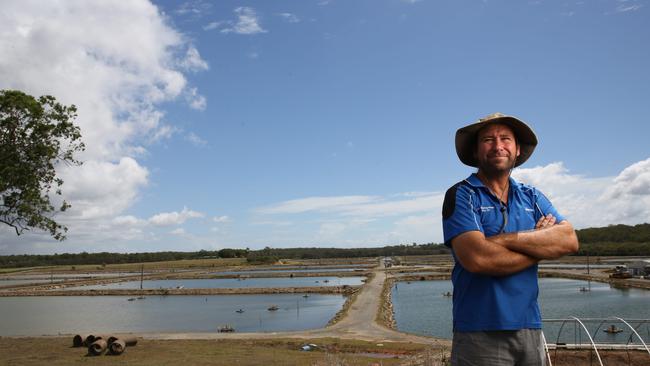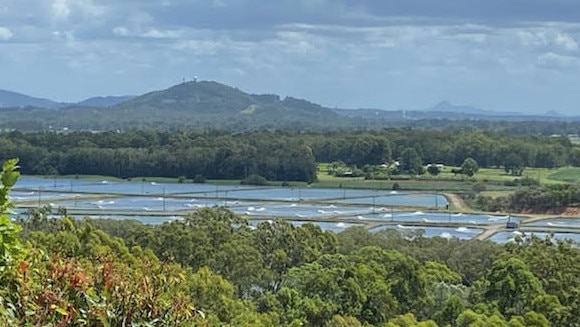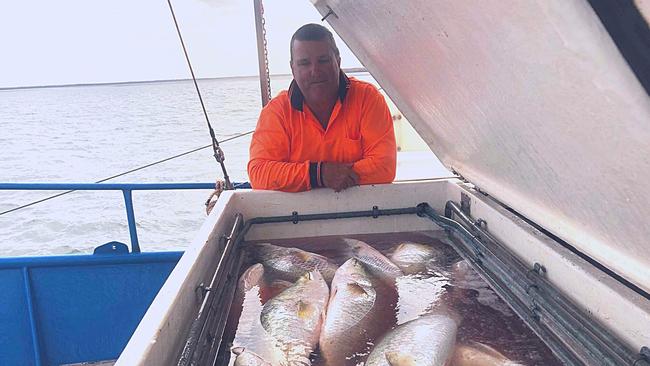Logan River prawn farms flooded as Easter prices tipped to float to the top
The fallout from last week’s flood could extend to the Easter table after stock from two prawn farms washed into river systems.
Logan
Don't miss out on the headlines from Logan. Followed categories will be added to My News.
Seafood lovers in flood-affected southeast Queensland may be forced to pay premium prices for prawns, crabs and Moreton Bay bugs this Easter.
Last week’s devastating flood muddied waters in Moreton Bay and inundated ponds at two prawn farms on the Logan River.

Unofficial reports claimed prawns from the farms were washed out with flood waters into the bay, where the insidious white spot disease was declared endemic in February last year.
Logan River prawn farmer Warren Truloff said the Easter harvest had already started but said the flood waters would not affect the taste of prawns.
He said he expected to produce 190 tonnes this year, which was down on pre-white spot figures of more than 200 tonnes.
“There would be a big change for prawns moving from the farm to salt water but farmers control the salt levels of their harvest with brine, so those prawns will not taste any different.”

Queensland Seafood Industry Association vice president Shane Snow said the full effects of the flood on the state’s seafood industry were still unknown but anticipated a rise in prices following a drop in the annual Easter prawn harvest.
“We are yet to determine how much stock was washed away into Moreton Bay and also what effect the flood waters have had on stocks,” he said.
“Unfortunately, a seafood labelling Bill before state parliament will come too late if imported seafood happens to fill the Easter demand void.
“Consumers will not be able to tell where the packaged seafood has come from, which is what the legislation hopes to achieve.”
A report on the proposed legislation is due back in Parliament before May 17.
Mr Snow said if passed, it was likely to push up the price of seafood in restaurants making this the last Easter of lower prices.
Under the seafood labelling amendment Bill, fish shops will have to clearly state where produce is from and menus in restaurants will also have to state produce origin.
The lack of seafood labelling, along with the fallout from white spot and cases of import regulation breaches, led 670 people to sign a petition claiming a loss of confidence in the state government’s fisheries management.

Mr Snow said commercial fishers who signed the petition were angered by a range of quotas including a mooted scaling back of catch for Spanish mackerel.
“How can we have confidence after white spot invaded Moreton Bay?” Mr Snow said.
“The state government keeps locking up areas and then imposing more and more stringent take quotas on commercial fishers.
“The quotas, including those proposed for Spanish mackerel, will not achieve the environmental gains the government is aiming for and is really just protecting recreational fishers and farmers at the expense of commercial fishers.”
Fisheries Minister Mark Furner said assessments along the east coast would be used to determine quotas and with a recent report finding Spanish mackerel stock was at 17 per cent.
“No changes have been made to recreational or commercial fishing rules for Spanish mackerel at this time, and none will be made without public consultation with recreational and commercial fishers,” Mr Furner said.
“Mandating seafood origin labelling in restaurants and cafes could increase the regulatory burden on those businesses, and compliance costs could be significant as menus would need to change continually to reflect seafood sources.
“Food service businesses can already choose to identify the origin of seafood on their menus.”





